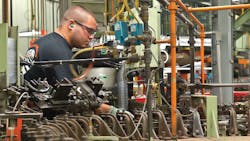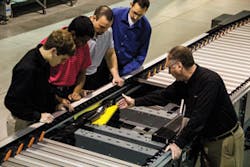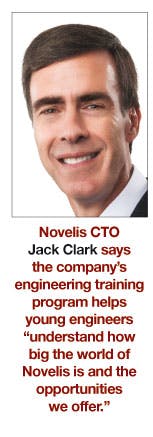The iGeneration Comes to Manufacturing (We Hope)
"This generation is industrious, ambitious and they want to move ahead. They will make an absolutely amazing manufacturing workforce."
Deanna Postlewaite, business unit manager for Lincoln Electric Virtual Welding Training, is talking about millennials, an enormous group of more than 80 million young people. It is often defined as the demographic cohort born from 1982 through 2000.
Postlewaite manages Lincoln Electric's efforts to connect with young people through a welding training system that has aspects of a video game. Schools, unions and other training facilities can use the company's VRTEX 360 to provide budding welders with training on various welding technologies in virtual environments that range from process piping in a power plant to iron work on a high-rise building site.
Postlewaite says millennials present manufacturing with an exciting opportunity to capitalize on their energy, enthusiasm and tech savvy and create a more competitive industry. There are plenty of negative views of millennials in circulation as well -- a generation with less of a work ethic, less loyalty to employers and more need to receive praise for even routine assignments. Wherever the truth lies, how manufacturers deal with this new generation could have more influence on American manufacturing's fortunes than any economic or technology trend.
See Also: Manufacturing Workforce Management Best Practices
Attracting millennials becomes especially critical as the generation born in the aftermath of World War II gradually disappears from the workforce. Since January 2011, Pew Research notes, baby boomers have been retiring at the rate of 10,000 a day and will continue to do so for the next 17 years.
"What we are facing is no different than the rest of North American manufacturing. I would not say there is a huge crisis brewing, but it is something we have to pay very particular attention to," says Jack Clark, chief technology officer for Novelis, a manufacturer and recycler of aluminum with 25 operating facilities on four continents. "I do have a concern that as manufacturing comes back to the United States and the economy continues to grow, this will be more and more of an issue for us."
For much of their lives, millennials witnessed the steady erosion of the manufacturing workforce in the United States. In January 1982, the manufacturing sector employed just over 18 million. By January of this year, the number was just shy of 12 million. When millennials got any news of manufacturing, it was often of plants shutting and jobs moving offshore.
No wonder, then, that manufacturing has some serious image issues to overcome if it is to attract talented young employees. One problem, Postlewaite notes, is that parents and educators recognize the value of manufacturing -- but, heeding its recent history, they don't encourage young people to enter the industry.
"I hear a lot of people say that the younger generation doesn't have the right skills, that we've walked away from the hands-on type of learning environment like a shop class. We have, but that has been driven by us -- by parents, by educators, by the mass of people that really shape a student's mindset," she says.
Postlewaite says these same influencers have to help students see what modern manufacturing can offer them in terms of a career: "A millennial wants to see the steps. They don't want to just work as a welder. They want to work as a welder and then become a shift supervisor and then the plant manager. They want to see a career path. If we can show that manufacturing has an exciting career pathway for them, that will make a huge difference."
The stakes for manufacturing are high. Competition has never been more keen for talent at every level, from skilled machinists to engineers to company executives. Already, manufacturers' inability to find and retain talent is having a direct impact on their financial results.
A recent report from Aberdeen Group found that 63% of industrial equipment manufacturers do not have enough engineering staff to manage their current workload. Among the pressures they cite as driving their search for engineering talent is meeting company growth objectives (52%) and meeting market goals (44%).
In testimony last month before a House Energy and Commerce subcommittee, Sandra Westlund-Deenihan, CEO of Quality Float Works Inc., a small manufacturing firm in suburban Chicago, discussed how the skills gap had impacted her company of 25 people.
"At one point last year, I had three machinist job openings available for more than 10 months. Some quick math will tell you this translated to more than 10% of my workforce," Westlund-Deenihan told the panel. She said her firm had enough business to warrant hiring a second shift, "but I am unable to find enough people with the basic skills necessary to manufacture a quality product."
Millennials: The Great Communicators
While any attempt to characterize a whole generation will be flawed, it is safe to say that millennials bring a new level of familiarity with technology, particularly communications technology.
In fact, a Pew Research study of millennials found that 24% thought their generation was unique because of its technology use. "For example, three-quarters of millennials have created a profile on a social networking site, compared with half of Xers, 30% of Boomers and 6% of Silents. There are big generation gaps, as well, in using wireless technology, playing video games and posting self-created videos online. Millennials are also more likely than older adults to say technology makes life easier and brings family and friends closer together."
That pervasive interaction with technology, particularly cell phones and the endless information available on the Internet, has helped define millennials' expectations about the workforce, says Ron Selewach, CEO and founder of Human Resource Management Center, developers of automated candidate assessments.
They have come to expect easily accessible information at their disposal," says Selewach. He says baby boomers often "interpret that as a challenge to our authority, but it is really not intended to be that. They just presume that information about the company, the culture, the job, the mission, the value of the job will be readily accessible to them. Traditionally, those things haven't been all that accessible."
Read how Corning's new leadership development program is helping it attract top talent.
Two years ago, Ron Wilson began blogging in part as a way to communicate with the millennials entering GE Lighting. The demographics of the business' workforce are rapidly shifting, notes Wilson, the Global Supply Chain general manager of GE Lighting. He estimates that the percentage of millennials in its manufacturing engineering and leadership ranks has doubled in the last three to four years to the mid-teens, and he expects millennials will make up one-third of that group in the next four to five years.
GE has a program called the Operations Manager Leadership Program that is designed to engage young talent, broaden their experience and develop them into future company leaders. The two-year program gives participants four assignments, which can range from being a team leader of hourly workers on the shop floor to sourcing or manufacturing engineering.Wilson says millennials welcome this diversity of experience.
"They still are figuring out who they want to be in this manufacturing environment," says Wilson.
That diversity fits with a change he has seen in this generation of workers. "For the millennials coming in, it is as much about the experience they are getting as it is about the job itself. They think of jobs in terms of experience." In addition, he says, "They are more participative in their development and training. They want to be more engaged with their leaders." To help with that, says Wilson, GE provides these younger employees with more exposure to senior leadership.
As a global company, GE can also provide millennials with a diverse learning experience by offering them international assignments. "A U.S. millennial that is in our manufacturing training program may spend six months in Europe in a plant over there," says Wilson. And European hires get the same kinds of opportunities. GE also provides young workers in the second year of the leadership program an opportunity to begin a master's degree at Penn State University.
GE is also working on making sure that plant floor workers have the skills necessary to operate in increasingly sophisticated manufacturing environments. The company is working closely with community colleges to ensure curriculums match up with changing jobs. For example, at its Mattoon, Ill., plant, GE Lighting is investing in new technology and expanding capacity. It established a two-year degree as a requirement for some new jobs. While GE is hiring community college graduates, it is also offering these jobs to employees who complete an associate degree. GE partnered with Lake Land College to create classes tailored to GE's needs and offer them on-site before and after shifts. "Current employees love the idea of being able to advance their education and get a different skill set," says Wilson. "They know the workplace is changing and continuing to evolve and those skills will be important to them."
Novelis, the aluminum producer and recycler, initiated a project three years ago to examine its talent requirements and saw the need to improve its "bench strength" in its engineering and science ranks, says CTO Jack Clark. The company identified two sets of universities that could supply graduates and focused its efforts on the tier one schools. Novelis appoints a champion to represent the company at each school. The champion gets to know faculty and administrators, makes sure the company is represented at career fairs, understands the recruiting procedures at the school, and donates scholarship money.
Novelis prefers to bring in people who have had manufacturing experience through internships or co-op programs. Every generation of engineers needs to be trained in company products, processes and culture. In the past, many companies relied on informal coaching to accomplish this onboarding. Like GE, Novelis has developed a structured two-year program designed to get new employees up and running quickly.
"It has five learning weeks in it, and those weeks are really structured around what it takes to be a successful engineer at Novelis," says Clark. Classes range from basic metallurgy to procurement to legal issues. Experts fly in from all over the world to teach the classes. Those classes can provide young employees with their first international travel experience.
"We rotate the learning weeks between different countries. We had one guy that came out of our Berea, Ky., recycling center. I'm not sure he had ever left the state of Kentucky, and we're putting him on a plane to Dusseldorf, Germany, and then on a plane to Brazil. Not only does that help them understand how big the world of Novelis is and the opportunities we offer, but it helps buy some loyalty and helps with retention," Clark says.
"When they come out of this program, we have engineers that are very well-trained. We've done the best that we can with all these facets of the business, and they're off and running much faster than someone who wouldn't have had that opportunity," Clark notes.
Co-op programs have also been a key talent acquisition tool for Intelligrated, a material handling manufacturer and solutions provider headquartered in Mason, Ohio. Founded in 2001, the fast-growing company added 275 employees in 2012 and another 190 in 2013, bringing its total to 2,300.
Intelligrated reaches out to promising engineering students when they are college sophomores and seeks to enlist them in rotating school-work schedules. The co-op program offers students real-world experience that complements their classroom education, says Tom Luers, senior director of corporate human resources at Intelligrated. Currently, the program has 55 students active. Luers says the company will offer all of them jobs, and he expects virtually all of them will sign on.
Luers notes that Intelligrated offers highly engineered solutions to its customers. The young engineers it hires are tech-savvy, energetic and versed in the latest academic learning. The co-op program "gives us a great venue to bring on these young professionals and start mentoring them from day one. We make them real contributors from day one. They love it, and we truly value their contributions."
Luers acknowledges there are some differences between millennials and previous generations, such as their tech-savviness and greater interest in corporate social responsibility. He says they also seek more flexibility in their schedules, employing tools such as smartphones, conference calls and web conferencing to get work done. But he adds that they share with previous generations the desire to contribute in a solid job with good pay and benefits.
If U.S. manufacturing is successful in shedding its image as a stodgy dead end, it may find that one of the benefits of its efforts to attract millennials is a workforce that is increasingly well-equipped to cope with, and thrive in, an environment that is changing ever more rapidly and demanding innovation and collaborative thinking.
Postlewaite observes, "This generation will be so more apt to say, 'Why don't we automate this? Why don't we bring in technology to make it happen faster?' Even more than the 30-somethings in the workplace today, they are going to want to use the next exciting thing. Innovation will be more readily accepted, and that has the potential to make manufacturing change even faster than it has in the past."
About the Author
Steve Minter
Steve Minter, Executive Editor
Focus: Leadership, Global Economy, Energy
Call: 216-931-9281
Follow on Twitter: @SgMinterIW
An award-winning editor, Executive Editor Steve Minter covers leadership, global economic and trade issues and energy, tackling subject matter ranging from CEO profiles and leadership theories to economic trends and energy policy. As well, he supervises content development for editorial products including the magazine, IndustryWeek.com, research and information products, and conferences.
Before joining the IW staff, Steve was publisher and editorial director of Penton Media’s EHS Today, where he was instrumental in the development of the Champions of Safety and America’s Safest Companies recognition programs.
Steve received his B.A. in English from Oberlin College. He is married and has two adult children.


